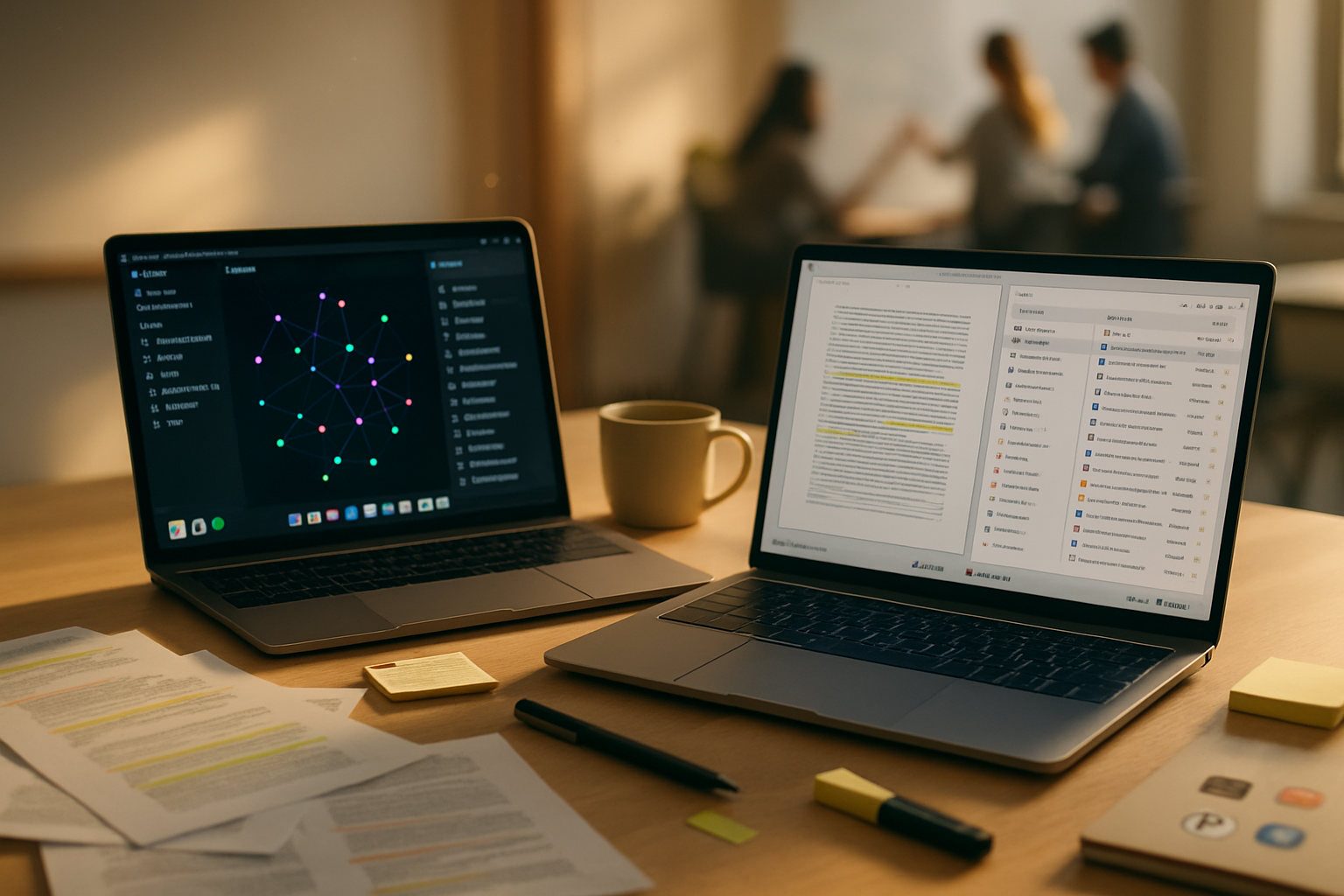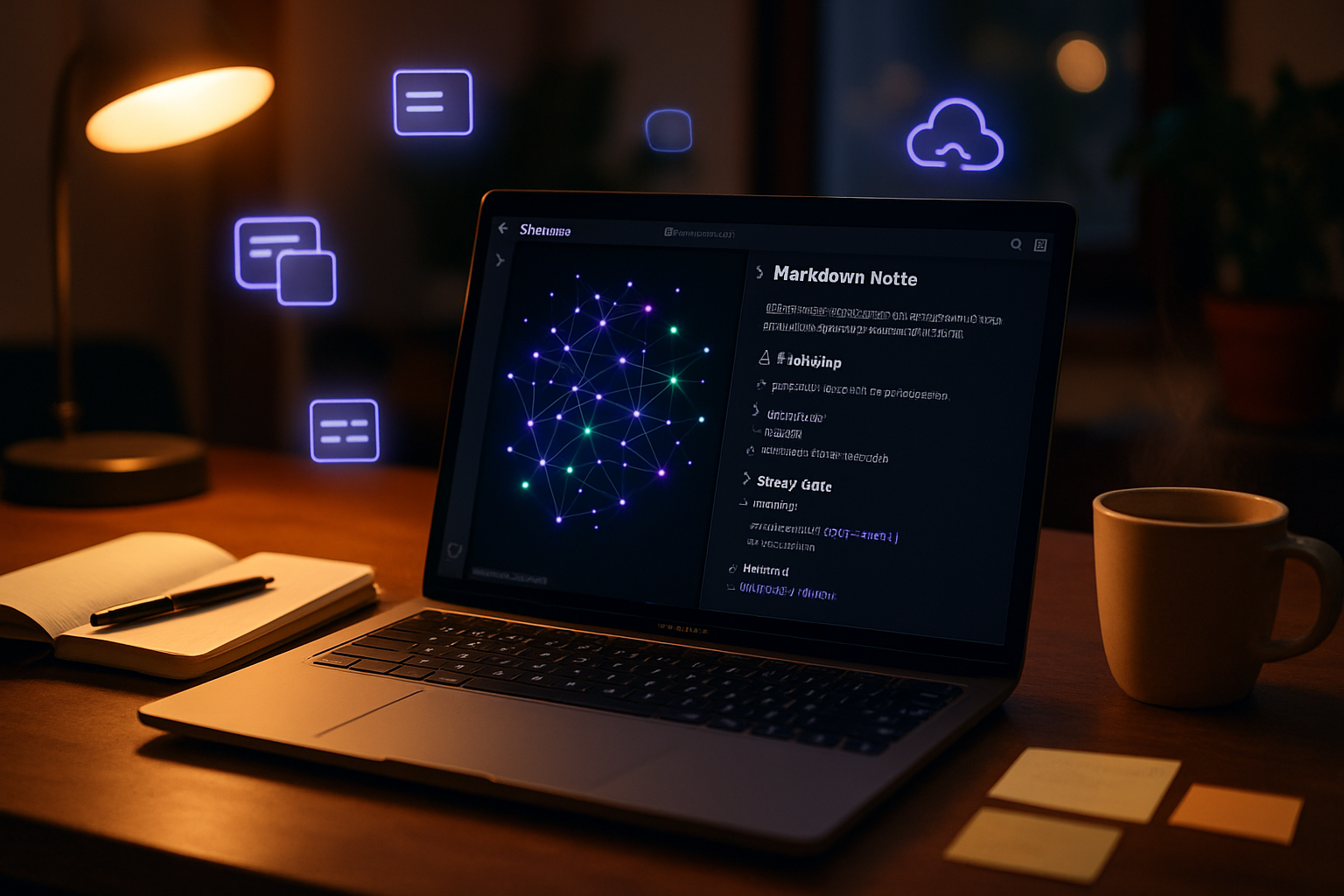· productivity · 7 min read
Comparative Review of the Best Web Apps for Study and Research
An in-depth comparative review of leading web apps for studying and research - note-takers, reference managers, collaborative editors and study tools - with feature breakdowns, pros/cons, recommended user profiles and practical workflow tips.

Why this review matters
Students and researchers now juggle PDFs, notes, bibliographies, collaborative drafts, flashcards and web highlights. Choosing the right combination of web apps can save hours, reduce friction and make insights reproducible. This review compares the most useful web apps for study and research across categories: note-taking/knowledge management, reference managers and PDF tools, collaborative writing, web annotation, and active study tools. For each app I summarize key features, strengths, limitations and the type of user who benefits most.
How I compared the apps (criteria)
Each app is judged on these practical criteria:
- Core functionality - note-taking, citation management, PDF annotation, LaTeX support, flashcards, etc.
- Organization & search - tagging, backlinks, full-text search, filters.
- Collaboration - real-time editing, sharing, commenting.
- Interoperability - export formats, integrations (Google Drive, Zotero, Word), browser extensions, APIs.
- Offline & mobile support.
- Learning curve and customizability.
- Pricing and data/privacy considerations.
Note-taking & knowledge management
Notion
- Website: Notion
- What it does - All-in-one workspace combining notes, databases, kanban boards, and simple templates.
- Strengths - Beautiful, highly flexible databases, templates for course schedules and reading lists, robust collaborative features, good web clipper.
- Limitations - Less optimized for complex academic citation workflows and versioning for long-form academic papers; offline support is limited compared with native apps.
- Best for - Undergraduates and teams who want a single workspace for notes, project boards and shared resources.
Roam Research
- Website: Roam Research
- What it does - Bi-directional linking and networked thinking for building a personal knowledge graph.
- Strengths - Backlinks, daily notes, and block-level organization encourage idea synthesis; excellent for literature notes and connecting ideas across sources.
- Limitations - Subscription cost is higher; steeper learning curve and fewer native export options for traditional academic workflows.
- Best for - Grad students and researchers building a long-term Zettelkasten-style knowledge base.
Obsidian (web + desktop ecosystem)
- Website: Obsidian
- What it does - Markdown-based personal knowledge base with plugins and graph view.
- Strengths - Local-first storage with optional sync, rich plugin ecosystem (publish, citation plugins), customizable and privacy-friendly.
- Limitations - Desktop-first model means web-only users will miss some benefits; plugin setup can be technical.
- Best for - Researchers who prefer offline-first control and heavy customization.
Evernote / OneNote
- Websites: Evernote, OneNote
- What they do - Classic note-takers with strong search and cross-device sync.
- Strengths - Mature feature sets, good OCR, simple organization for course notes.
- Limitations - Less suited to networked linking compared to Roam/Obsidian; premium tiers often required for heavy usage.
- Best for - Rapid capture and linear lecture notes.
Reference management & PDF annotation
Reference managers are central to research workflows. Below are web-capable leaders.
Zotero
- Website: Zotero
- What it does - Open-source reference manager with browser connector and group libraries.
- Strengths - Excellent metadata capture, free tier, plugins (e.g., Zotero’s Word/LibreOffice integration), group collaboration, attachments and PDF annotation via Zotero PDF reader.
- Limitations - The web library is improving, but many users rely on the desktop app for heavy lifting.
- Best for - Researchers wanting a cost-effective, community-driven tool with good export options.
Mendeley (Elsevier)
- Website: Mendeley
- What it does - Reference manager with PDF library and social features.
- Strengths - Integrated PDF viewer and annotation, citation plugins.
- Limitations - Changes under corporate ownership have concerned some users; storage limits in free tier.
- Best for - Users who prefer an integrated PDF-focused experience backed by a large company.
Paperpile
- Website: Paperpile
- What it does - Cloud-first reference manager built for Google ecosystem (Docs, Drive).
- Strengths - Smooth Google Docs integration, fast web interface, Chrome extension for quick saves.
- Limitations - Premium subscription required; best experience tied to Google Workspace.
- Best for - Researchers who write chiefly in Google Docs and want minimal friction managing citations.
EndNote Online / ReadCube Papers
- Websites: EndNote, ReadCube Papers
- What they do - Commercial reference management with advanced features (PDF syncing, metrics, discovery).
- Strengths - Robust feature sets and enterprise-friendly options.
- Limitations - Cost and proprietary formats can be barriers for students.
- Best for - Labs or institutions with licenses and heavy bibliographic needs.
Collaborative writing & LaTeX
Google Docs
- Website: Google Docs
- What it does - Ubiquitous web-based collaborative editor.
- Strengths - Real-time collaboration, comments, version history, ubiquitous sharing.
- Limitations - Not ideal for LaTeX-heavy documents without add-ons.
- Best for - Group reports, collaborative drafting, and quick sharing.
Overleaf
- Website: Overleaf
- What it does - Collaborative LaTeX editor in the browser.
- Strengths - Templates for journals, real-time LaTeX compilation, GitHub integration, citation support.
- Limitations - LaTeX learning curve for newcomers; premium features for private projects.
- Best for - STEM researchers and students writing LaTeX papers or theses collaboratively.
Web annotation & active reading
Hypothesis
- Website: Hypothesis
- What it does - Open-source web annotation tool for highlighting and commenting on web pages and PDFs.
- Strengths - Great for close reading, class assignments, highlighting primary sources and sharing annotations.
- Limitations - Collaboration is via shared groups; not a full note-taking app.
- Best for - Seminars, close reading tasks, and collaborative source analysis.
Read & Save tools (Pocket, Instapaper)
- Pocket - save-for-later reading with basic highlights. Useful for curating web sources.
Active study & memory tools
Anki (AnkiWeb)
- Website: AnkiWeb
- What it does - Spaced-repetition flashcards for durable learning.
- Strengths - Extremely effective for long-term memorization; highly customizable.
- Limitations - Interface can feel technical; best when paired with good card design.
- Best for - Medical, language and other factual heavy disciplines.
Quizlet
- Website: Quizlet
- What it does - Flashcards, practice tests and study games.
- Strengths - Friendly UI, crowd-shared sets, great for quick revision.
- Limitations - Less powerful spaced-repetition algorithm compared with Anki.
- Best for - Fast revision, shared class decks, and formative practice.
Quick comparison matrix (high-level)
| Category | Best for collaboration | Best for deep knowledge-building | Best for citations/PDFs | Best for LaTeX |
|---|---|---|---|---|
| Note-taking | Notion, Google Docs | Roam, Obsidian | Zotero (notes + PDFs) | Overleaf |
| Reference mgmt | Zotero (groups) | Paperpile (Docs integration) | Zotero / Mendeley | EndNote (export to LaTeX/BibTeX) |
| Annotation | Hypothesis, Zotero PDF reader | Obsidian (if linked notes) | ReadCube Papers | Overleaf (for source collaboration) |
| Active recall | Quizlet | Anki | - | - |
Recommended stacks by user profile
- Undergraduate (project & exam-focused) - Notion + Google Docs + Quizlet. Notion for organizing courses and project boards; Google Docs for group writing; Quizlet for quick study.
- Graduate student (literature-heavy thesis) - Zotero + Obsidian/Roam + Overleaf. Zotero for bibliography and PDFs; Obsidian/Roam for networked literature notes; Overleaf for thesis writing with LaTeX.
- Research lab / collaborative group - Google Docs or Overleaf (depending on format) + Zotero/ReadCube for shared references + Notion for project tracking.
- Professional exam prep - Anki + PDF reader + a scheduler (Notion or Google Calendar).
Integrations & interoperability tips
- Use a single canonical reference manager (Zotero or Paperpile) and export BibTeX when writing in LaTeX or Overleaf.
- Use web clippers (Notion, Zotero, Pocket) to quickly capture articles; process clipped items daily into permanent notes.
- Connect your note-taking app to your flashcard system - Obsidian and Anki have plugins to generate cards from notes; Notion templates can export to CSV for flashcards.
- For group work, pick the platform your collaborators already use - adoption friction is the biggest real-world cost.
Privacy, cost and long-term access
- Open-source tools (Zotero, Hypothesis) tend to be more preservation-friendly and export-friendly.
- Cloud-first commercial platforms (Notion, Paperpile, ReadCube) provide convenience but check export paths and backup your data regularly.
- Many apps offer free tiers sufficient for students; however, generous storage or advanced collaboration features may require paid plans.
Practical workflow example (literature-review to paper)
- Discover and save - Use Paperpile/Pocket/Zotero browser connector to save candidate papers.
- Annotate & summarize - Read and annotate in Zotero/ReadCube or Hypothesis. Create a short literature note in Obsidian/Roam (bibliographic metadata + 1–2 sentence summary + key quotes).
- Organize - Tag notes by theme and link related notes (backlinks in Obsidian/Roam).
- Draft - Start a collaborative outline in Google Docs or draft directly in Overleaf if using LaTeX.
- Reference - Insert citations from Zotero/Paperpile and export a BibTeX file for Overleaf or use citation plugins for Word/Docs.
- Revise & review - Share drafts with collaborators; use Hypothesis or Google Docs comments for targeted feedback.
Final verdict - no single winner
The most effective setup depends on your goals:
- For organized, collaborative classwork and projects, Notion + Google Docs + Quizlet is a low-friction, high-payoff mix.
- For deep, long-term research and reproducible scholarship, combine Zotero + Obsidian/Roam + Overleaf for a powerful, research-focused pipeline.
- If memorization is critical, integrate Anki and design a card-creation habit from your notes.
Whatever you choose, aim for a small set of interoperable tools you actually use. Frequent switching or accumulating many half-used apps creates fragmentation and lost time.
Useful links and resources
- Notion: https://www.notion.so
- Roam Research: https://roamresearch.com
- Obsidian: https://obsidian.md
- Zotero: https://www.zotero.org
- Mendeley: https://www.mendeley.com
- Paperpile: https://paperpile.com
- Overleaf: https://www.overleaf.com
- Hypothesis: https://web.hypothes.is
- Google Docs: https://docs.google.com
- AnkiWeb: https://ankiweb.net
- Quizlet: https://quizlet.com
If you build a simple documented workflow (capture → annotate → link → write → review) and choose tools that interoperate, you’ll spend less time fighting your apps and more time producing high-quality work.



